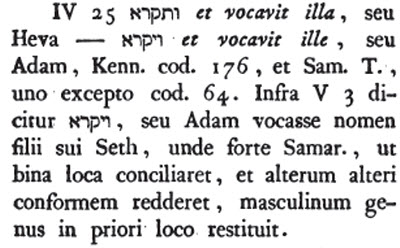ࠅࠉࠃࠏ ࠀࠃࠌ ࠏࠅࠃ ࠀࠕ ࠀࠔࠕࠅ ࠅࠕࠋࠃ ࠁࠍ ࠅࠉࠒࠓࠀ ࠀࠕ ࠔࠌࠅ ࠔࠕ ࠊࠉ ࠔࠕ ࠋࠉ ࠀࠋࠄࠉࠌ ࠆࠓࠏ ࠀࠇࠓ ࠕࠇࠕ ࠄࠁࠋ ࠊࠉ ࠄࠓࠂࠅ ࠒࠉࠍ
Gen 4:25 [Samaritan Pentateuch]
וידע אדם עוד את אשתו ותלד בן ויקרא את שמו שת כי שת לי אלהים זרע אחר תחת הבל כי הרגו קין׃
Gen 4:25 [Masoretic Text]
וַיֵּ֨דַע אָדָ֥ם עֹוד֙ אֶת־אִשְׁתֹּ֔ו וַתֵּ֣לֶד בֵּ֔ן וַתִּקְרָ֥א אֶת־שְׁמֹ֖ו שֵׁ֑ת כִּ֣י שָֽׁת־לִ֤י אֱלֹהִים֙ זֶ֣רַע אַחֵ֔ר תַּ֣חַת הֶ֔בֶל כִּ֥י הֲרָגֹ֖ו קָֽיִן׃
Gen 4:25 [Samaritan Targum]
וחכם אדם עורי ית אתתה ואולד בר וזעק ית שמה שת דלא שבה לי אלהה נוף חורן חליפת הבל בר קתלה קין:
And Adam knew his wife again, and she bore a son and called his name Shet, saying, “For God has appointed me another offspring instead of Hevel, for Qayin killed him.”
| Number | Hebrew | Samaritan | Translation |
|---|---|---|---|
| 1 | וידע | ࠅࠉࠃࠏ | And he knew |
| 2 | אדם | ࠀࠃࠌ | Adam |
| 3 | עוד | ࠏࠅࠃ | Again |
| 4 | את | ࠀࠕ | (direct object marker) |
| 5 | אשתו | ࠀࠔࠕࠅ | His wife |
| 6 | ותלד | ࠅࠕࠋࠃ | And she bore |
| 7 | בן | ࠁࠍ | A son |
| 8 | ויקרא | ࠅࠉࠒࠓࠀ | And he called |
| 9 | את | ࠀࠕ | (direct object marker) |
| 10 | שמו | ࠔࠌࠅ | His name |
| 11 | שת | ࠔࠕ | Seth |
| 12 | כי | ࠊࠉ | For |
| 13 | שת | ࠔࠕ | God has appointed |
| 14 | לי | ࠋࠉ | For me |
| 15 | אלהים | ࠀࠋࠄࠉࠌ | God |
| 16 | זרע | ࠆࠓࠏ | Seed |
| 17 | אחר | ࠀࠇࠓ | Another |
| 18 | תחת | ࠕࠇࠕ | Instead of |
| 19 | הבל | ࠄࠁࠋ | Abel |
| 20 | כי | ࠊࠉ | For |
| 21 | הרגו | ࠄࠓࠂࠅ | Killed him |
| 22 | קין | ࠒࠉࠍ | Cain |
Morphology
- וַיֵּ֨דַע (wayyēdaʿ) – Root: ידע (y-d-ʿ); Form: Qal wayyiqtol (past narrative), third masculine singular; Translation: “And he knew”; Notes: Refers to intimate relations between Adam and his wife.
- אָדָ֥ם (ʾāḏām) – Root: אדם (ʾ-d-m); Form: Proper noun, singular masculine; Translation: “Adam”; Notes: The proper name of the first man.
- עֹוד֙ (ʿôḏ) – Root: עוד (ʿ-w-d); Form: Adverb; Translation: “again”; Notes: Indicates a repetition of the action.
- אֶת־אִשְׁתֹּ֔ו (ʾeṯ-ʾištō) – Root: אשה (ʾ-š-h); Form: Direct object marker אֶת + noun, singular feminine with third masculine singular suffix; Translation: “his wife”; Notes: Refers to Adam’s wife, Ḥavah (Eve).
- וַתֵּ֣לֶד (wattēleḏ) – Root: ילד (y-l-d); Form: Qal wayyiqtol (past narrative), third feminine singular; Translation: “and she bore”; Notes: Refers to the birth of Shet.
- בֵּ֔ן (bēn) – Root: בן (b-n); Form: Noun, singular masculine; Translation: “a son”; Notes: Indicates the offspring born to Adam and his wife.
- וַתִּקְרָ֥א (wattiqraʾ) – Root: קרא (q-r-ʾ); Form: Qal wayyiqtol (past narrative), third feminine singular; Translation: “and she called”; Notes: Refers to the act of naming the child.
- אֶת־שְׁמֹ֖ו (ʾeṯ-šemō) – Root: שם (š-m); Form: Direct object marker אֶת + noun, singular masculine with third masculine singular suffix; Translation: “his name”; Notes: Indicates the name given to the child.
- שֵׁ֑ת (šēṯ) – Root: שת (š-t); Form: Proper noun, singular masculine; Translation: “Shet”; Notes: The name of Adam and Eve’s son, meaning “appointed.”
- כִּ֣י (kî) – Root: כי (k-y); Form: Conjunction; Translation: “because”; Notes: Introduces the explanation for naming the child.
- שָֽׁת־ (šāṯ) – Root: שת (š-t); Form: Qal perfect, third masculine singular; Translation: “has appointed”; Notes: Refers to God providing another child.
- לִ֤י (lî) – Root: ל (l); Form: Preposition לְ + first person singular suffix; Translation: “for me”; Notes: Indicates personal possession or benefit.
- אֱלֹהִים֙ (ʾĕlōhîm) – Root: אלה (ʾ-l-h); Form: Proper noun, plural masculine; Translation: “God”; Notes: Refers to the Creator.
- זֶ֣רַע (zeraʿ) – Root: זרע (z-r-ʿ); Form: Noun, singular masculine; Translation: “offspring”; Notes: Refers to the continuation of the family line.
- אַחֵ֔ר (ʾaḥēr) – Root: אחר (ʾ-ḥ-r); Form: Adjective, singular masculine; Translation: “another”; Notes: Indicates the replacement for Hevel.
- תַּ֣חַת (taḥaṯ) – Root: תחת (t-ḥ-t); Form: Preposition; Translation: “instead of”; Notes: Indicates substitution or replacement.
- הֶ֔בֶל (hevel) – Root: הבל (h-b-l); Form: Proper noun, singular masculine; Translation: “Hevel”; Notes: Refers to Adam and Eve’s son who was killed by Qayin.
- כִּ֥י (kî) – Root: כי (k-y); Form: Conjunction; Translation: “for”; Notes: Explains the reason for the substitution.
- הֲרָגֹ֖ו (hăraḡō) – Root: הרג (h-r-g); Form: Qal perfect, third masculine singular with third masculine singular suffix; Translation: “killed him”; Notes: Refers to Qayin killing Hevel.
- קָֽיִן (qayin) – Root: קין (q-y-n); Form: Proper noun, singular masculine; Translation: “Qayin”; Notes: Refers to the firstborn son of Adam and Eve.
